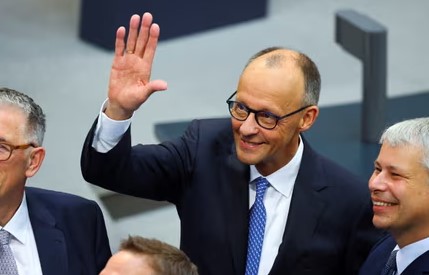Germany’s parliament, known as the Bundestag, witnessed a surprising and historic moment. Friedrich Merz, leader of Germany’s conservative Christian Democratic Union (CDU), fell short of securing the required votes to become the nation’s next chancellor.
A Historic Setback in Parliament
This surprising result came just two and a half months after his party emerged victorious in the national elections. Merz needed a minimum of 316 votes in the 630-seat Bundestag to be elected.However, he only got 310. This shortfall of six votes was a major blow for him and his party. It was especially unexpected because Merz had already formed a coalition with the center-left Social Democratic Party (SPD). Collectively, the coalition held more seats than was necessary for a majority.
What made the situation more shocking was that around 18 members of parliament, who were expected to support Merz, did not vote for him. This kind of defeat is extremely rare in Germany. In fact, no candidate for chancellor has failed in such a way since the year 1949, when the current political system was established after World War II.
Even though his coalition had the numbers on paper, the vote revealed cracks within the partnership. This unexpected failure has now led to a period of confusion and uncertainty in the German parliament.
Germany Blocks Jet Deal with Turkey Amid Hamas Talks and Democracy Crackdown
Confusion, Criticism, and Coalition Tensions
Under Germany’s constitution, there is no limit to the number of votes that can be held to choose a chancellor. The parliament now has 14 more days to select either Merz again or a new candidate. If no candidate secures an absolute majority, the rules allow for someone to be elected without one.
For now, no new vote is expected before Wednesday. But the Bundestag will meet again at midday, and the atmosphere is one of confusion and surprise.
Many political observers are calling Friedrich Merz’s defeat a shame. They believe that members of the SPD—his coalition partner—may have caused this setback. Some SPD members are reportedly unhappy with the coalition deal signed just one day before the vote. Even though the deal was meant to signal unity, the actual vote suggested otherwise.
On Monday, Merz had said it was their “historic duty” to make the government work. But Tuesday’s failed vote painted a very different picture. The vote has now raised questions about how stable this new coalition really is.
The far-right party, Alternative for Germany (AfD), which came in second place in the February election with 20.8% of the vote, quickly criticized the result. Their co-leader Alice Weidel posted on social media that the vote proved how weak the coalition between the CDU and SPD really was. She pointed out that voters had already rejected this type of alliance.
Germany’s Spy Agency Officially Declares AfD an Extremist Threat to Democracy
Grand Ceremony Overshadowed by Political Drama
Germany’s smooth and formal government transitions took a dramatic turn when Friedrich Merz, expected to become the next chancellor, failed to secure enough votes in parliament. His defeat occurred just hours after departing Chancellor Olaf Scholz was given a military “Grand Tattoo” ceremony to mark the conclusion of his tenure.
Merz, 69, was widely seen as the frontrunner and had formed a coalition with the SPD, holding a narrow 12-seat majority. Former Chancellor Angela Merkel even returned to the Bundestag for what was expected to be a historic day. Instead, the failed vote raised serious doubts about the coalition’s unity and future.
Now, Merz and his allies must decide whether to try another vote—risking further failure—or regroup. The surprise defeat has not only delayed the formation of a new government but revealed deeper cracks within the coalition.
Economically, Germany had just started recovering from a two-year recession, but rising U.S. tariffs and a shrinking services sector continue to pose challenges. Merz’s failure adds fresh uncertainty to an already fragile political and economic landscape.

